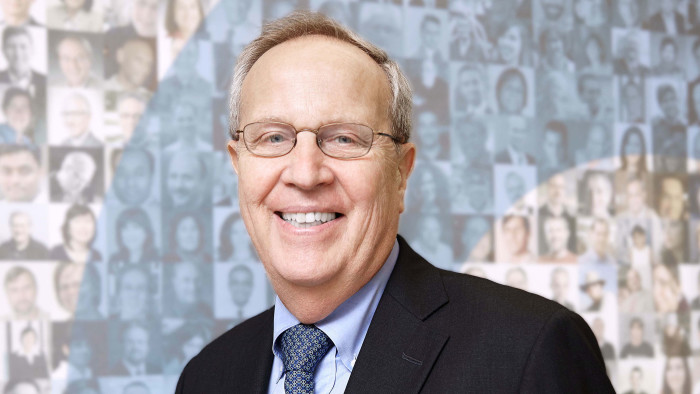Coursera chief on the future of online learning and the Trump era

Simply sign up to the Business education myFT Digest -- delivered directly to your inbox.
When Rick Levin, chief executive of Coursera, ordered a delivery of tea from a boutique supplier in Colorado recently, he had no idea that the company had been growing with the help of business courses on his online platform.
The next day he discovered the chief executive of Two Leaves and a Bud, Richard Rosenfeld, had taken Wharton’s introduction to business finance on Coursera. The company’s comptroller had also completed finance courses and the marketing team had used the platform as they rebranded the business.
“What online technology does for business schools is very substantially expand their market to people who don’t take time out from their career to come back to business school,” Mr Levin says.
Wearing smart business attire, the former president of Yale University cuts an unlikely figure in Coursera’s offices in Mountain View, the heart of dressed-down Silicon Valley. Since joining Coursera in 2014, he has bridged the gap between the traditional world of education and technology businesses that are disrupting the sector.
Coursera was originally designed to provide the infrastructure for universities to put any course online. However, it was quickly adopted by people looking for practical business courses to improve their performance at work. More than 30 per cent of all content is now related to business and big-name business schools, which were initially reluctant and feared cannibalisation of their courses, have come online.
“I think the breakthrough occurred when Wharton took the plunge and put a mini-version of its first-year core curriculum online,” he says. “It was extremely successful and that got people more interested. It saw the potential branding and visibility to a large global audience — our 24m learners on the platform.”
Now students can study full MBAs on Coursera, with the University of Illinois offering a two-year course that takes approximately 20 hours a week and costs about $20,000. There have been three cohorts, with a quality of students Mr Levin says was as good as those the university gets on campus, and with a 98 per cent retention rate.
Mr Levin says that he expects more business schools to come on board in the next year, as awareness grows that running an online course gives them greater reach and does not deter people who would pay for an in-person or residential course.
People studying for online MBAs tend to be slightly older than those on campus programmes and are often unwilling to move or leave their jobs for family or career reasons. Some study far away from the accrediting schools — 45 per cent of learners on Coursera are from developing countries — and many could not afford a regular MBA.
As Coursera begins to sell directly to businesses, Mr Levin thinks companies will start to offer training for employees lower down the pyramid.
“Selling into companies is an important business for many business schools. Our view is this is largely complementary,” he says.
“Business schools have historically [targeted] live programmes to very select audiences within the company,” he adds. “But because this is so scaleable, it is an opportunity to train at low cost the entire workforce, or entire managerial workforce.”
Coursera will find it hard to replicate the networking opportunities available at business schools, where students bond on campus or on study trips away, establishing life-long connections. However, it encourages students to meet in person when possible. Europeans among the first cohort of students on the Illinois MBA got together at a three-day conference in the Netherlands.
Mr Levin says EdX and Udacity, rival providers of massive open online courses, or Moocs, do not focus on business to the same extent. Coursera may face a challenge from some of the best-known providers going it alone, such as Harvard Business School’s HBX, which offers CORe, a primer on business thinking designed for students and early career employees with little business education.
Coursera has ambitions to reach beyond the traditional MBA student, or even those who are already taking online MBAs. Through a programme called Coursera for Governments and Nonprofits, launched late last year, it is working with administrations in Malaysia and Kazakhstan to offer courses. In the US, it is helping the department of veterans to train military personnel for civilian jobs and is working to provide courses for the unemployed in the state of Maine.
Mr Levin believes the US government has an opportunity to encourage life-long learning, perhaps through an extension of learning tax credits beyond the narrow group who qualify now.
“There is now much greater public awareness of the extent to which people have found themselves dislocated by technology or trade — more tech than trade but both are real,” he says.
“President Trump talks about building physical infrastructure but human capital infrastructure is equally important. Particularly the people who supported him would benefit greatly from mid-career training to get themselves better jobs.”
Comments